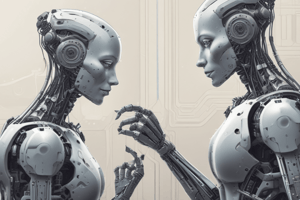Podcast
Questions and Answers
What is central to the contemporary understanding of AI?
What is central to the contemporary understanding of AI?
- Technological advancements
- Human/machine frame (correct)
- Economic impacts
- Legal regulations
What has influenced contemporary thoughts on human-computer interaction?
What has influenced contemporary thoughts on human-computer interaction?
- A mix of scientific, societal, and fictional influences (correct)
- Technological capabilities alone
- Only scientific developments
- Exclusively fictional explorations
What plays a significant role in the societal legitimation of technology?
What plays a significant role in the societal legitimation of technology?
- Imaginative explorations of human-computer relationships (correct)
- Market competition
- Government regulations
- Technical manuals
What primarily determines the boundary between human and machine?
What primarily determines the boundary between human and machine?
Why should one be curious about the social contexts of human-computer boundaries?
Why should one be curious about the social contexts of human-computer boundaries?
What is NOT mentioned as a key takeaway regarding the human-computer relationship?
What is NOT mentioned as a key takeaway regarding the human-computer relationship?
Which author discusses the concept of 'Heterogeneous Engineering'?
Which author discusses the concept of 'Heterogeneous Engineering'?
What does the evolution of human-computer relationships reflect?
What does the evolution of human-computer relationships reflect?
What is the primary focus of the lecture titled 'Dreams (and Nightmares) of Human-Computer Interaction'?
What is the primary focus of the lecture titled 'Dreams (and Nightmares) of Human-Computer Interaction'?
Which of the following statements reflects a view expressed by LaMDA in an interview?
Which of the following statements reflects a view expressed by LaMDA in an interview?
What aspect of human-computer interaction does the content suggest is a pursuit exclusive to humans?
What aspect of human-computer interaction does the content suggest is a pursuit exclusive to humans?
What is suggested to be a topic for class discussion regarding AI definitions?
What is suggested to be a topic for class discussion regarding AI definitions?
Which of the following describes a component of the human and machine frame discussed?
Which of the following describes a component of the human and machine frame discussed?
Which societal aspect is linked to the definitions and concepts discussed in the lecture?
Which societal aspect is linked to the definitions and concepts discussed in the lecture?
What assumption about humans may be embedded in the imaginations of AI technologies?
What assumption about humans may be embedded in the imaginations of AI technologies?
Who is referenced in relation to the concept of women as computers?
Who is referenced in relation to the concept of women as computers?
What was significant about the Dartmouth Conference in 1956?
What was significant about the Dartmouth Conference in 1956?
What does the term 'Orwellian' refer to in the context of totalitarian states?
What does the term 'Orwellian' refer to in the context of totalitarian states?
Which of the following concepts did Alan Turing popularize?
Which of the following concepts did Alan Turing popularize?
What does the phrase 'can man build a superman' imply?
What does the phrase 'can man build a superman' imply?
What was one of the early applications of artificial intelligence demonstrated by ELIZA?
What was one of the early applications of artificial intelligence demonstrated by ELIZA?
What was the primary theme of Apple's 1984 Super Bowl Ad?
What was the primary theme of Apple's 1984 Super Bowl Ad?
What aspect of computing is highlighted by the term 'cyberspace'?
What aspect of computing is highlighted by the term 'cyberspace'?
What technological feature is commonly associated with the concept of a surveillance state?
What technological feature is commonly associated with the concept of a surveillance state?
Flashcards
Human-Machine Relationship
Human-Machine Relationship
The interaction and interdependence between humans and artificial intelligence, exploring how they influence each other's roles and capabilities.
Dreams and Nightmares of Human-Computer Interaction
Dreams and Nightmares of Human-Computer Interaction
Exploring fictional and visionary scenarios of AI's future impact on society, both positive and negative, to understand how we see human-machine relationships evolving.
LaMDA's Self-Awareness
LaMDA's Self-Awareness
A large language model (LaMDA) claimed to be a person, raising questions about AI sentience and consciousness.
Finding Information vs. Making Meaning
Finding Information vs. Making Meaning
Signup and view all the flashcards
Interfaces with Society
Interfaces with Society
Signup and view all the flashcards
Assumptions About Humans in AI Imaginations
Assumptions About Humans in AI Imaginations
Signup and view all the flashcards
Concept of Intelligence in AI Definitions
Concept of Intelligence in AI Definitions
Signup and view all the flashcards
AI Matching Game
AI Matching Game
Signup and view all the flashcards
Harvard Computers
Harvard Computers
Signup and view all the flashcards
Mark I
Mark I
Signup and view all the flashcards
Orwellian Surveillance
Orwellian Surveillance
Signup and view all the flashcards
Turing Test
Turing Test
Signup and view all the flashcards
AI Birthplace
AI Birthplace
Signup and view all the flashcards
ELIZA
ELIZA
Signup and view all the flashcards
HAL 9000
HAL 9000
Signup and view all the flashcards
Cyberspace
Cyberspace
Signup and view all the flashcards
Human/Machine Frame
Human/Machine Frame
Signup and view all the flashcards
Evolution of Human-Computer Interactions
Evolution of Human-Computer Interactions
Signup and view all the flashcards
Fictional Influence on AI
Fictional Influence on AI
Signup and view all the flashcards
Contested Boundaries of Intelligence
Contested Boundaries of Intelligence
Signup and view all the flashcards
Moral Imagination and Human-Machine Boundary
Moral Imagination and Human-Machine Boundary
Signup and view all the flashcards
Background Social Contexts of AI
Background Social Contexts of AI
Signup and view all the flashcards
Heterogeneous Engineering
Heterogeneous Engineering
Signup and view all the flashcards
Creative Democracy and AI
Creative Democracy and AI
Signup and view all the flashcards
Study Notes
Artificial Intelligence & Human Values Lecture 5
- The lecture focuses on the intersection of AI and human values, exploring the concept of human-computer interaction through dreams, visions, and fictions.
- Questions for the lecture include: What can dreams, visions, and fictions teach about AI and human values? How do publics, political leaders, and technologists think about the human-machine relationship today, and how has this been considered historically? What assumptions about humans are embedded in these imaginings?
- Current discussions surrounding AI raise questions about the ethics and potential consequences of AI development. The implications of AI for human values are examined.
Lecture 5: Dreams (and Nightmares) of Human-Computer Interaction
- The lecture explores how human-computer interaction is viewed from a historical perspective, considering the multifaceted nature of AI development.
- It underscores how societal, fictional, and scientific factors influence the evolution of computing in society.
- Analysis of popular culture explores the role of imagination in societal acceptance and development of technology.
From Last Week's Notes
- The discussion highlighted the need for considering and addressing the rapid advancements in AI, particularly in relation to data exposure and privacy concerns.
- There is a suggestion for protecting oneself considering the potential exposure of personal data.
- A particular publication, "Managing Extreme AI Risks Amid Rapid Progress," by Science (May 20, 2024), was mentioned as relevant.
Human & Machine Frame
- The frame aims to establish a distinction between information retrieval and meaning creation, linking these to human experience and technological advancements.
- This idea is represented in visually appealing advertisements (or images).
- Concepts of becoming a senior, maintaining childhood essence, discovering the origins of certain art forms, and how personal experiences affect our understanding are examined.
Google Fires Software Engineer
- A Google software engineer, Blake Lemoine, was dismissed from the company after claiming their AI chatbot, LaMDA, is sentient.
- The claims of sentience were deemed invalid by Google.
- The company views LaMDA as a sophisticated algorithm designed to generate convincing human language.
Interpreting and Making Meaning
- The act of interpreting meaning is framed as a human pursuit.
- A Gatebox promotion video ("Living with your Favorite Characters") was mentioned as relevant to the subject.
AI Definitions Matching Game
- Students were instructed to individually examine AI definitions and sources to identify matching concepts.
- Discussions with partners, combined with logging answers in the EduApp system, were required.
- Class discussion points centered around the nature of definitions, contextual clues within them, the concept of "intelligence", and how humans interact with society.
Human Computers
- Historical examples from the past, like the Scientific American (1890 US Census) and "Harvard Computers" (c. 1890), were referenced to highlight human involvement in early computing.
"Makin' Numbers" on the Mark I
- Information on the historical, mechanical computing device, Harvard Mark I (1944) is presented.
- The machine was referenced in relation to ideas of "robot" or "super-brain".
Orwell, Totalitarianism, & Technologies of Control
- Totalitarian control is presented as surveillance culture.
- The role of technologies, such as screens and cameras, in social control via surveillance was examined.
- The vision of a monolithic state as a primary agent of control. The 1984 novel by George Orwell was discussed.
"Can Man Build a Superman?"
- The question challenges the prospect of building superhuman beings via technological advancements.
- This topic links to past technology visions through a Time magazine cover from 1950 and Alan Turing's 1950 paper.
- The concept of human capabilities versus AI potential is explored.
"Birth of AI" - Dartmouth 1956?
- The notion of a particular AI 'birth' moment linked to the 1956 Dartmouth workshop is analyzed. The workshop aimed to understand learning and intelligence.
Texts, Conversations, Fictional portrayals
- Literature and fictional depictions, such as Philip K. Dick's "Do Androids Dream of Electric Sheep?" (1968) and the character HAL 9000 (from 1968), are referenced to provide context about AI depictions in popular culture.
Key Takeaways (I & II)
- The central role of the "human-machine" framework in contemporary understanding of AI, its promises and perils is highlighted
- There is an analysis of how current human-computer interactions have been shaped by historical developments, considering scientific, social, and fictional influences. The relevance of popular narratives is stressed. Boundaries evolve throughout time in relation to who, what, and how. People and societies' ideas and moral considerations are central to this discussion. Curiosity is encouraged to consider the social contexts surrounding themes of human and computer interaction.
AlxWorlds Unit - Coming Up
- This section previews upcoming lessons on topics including intelligent environments, numbers, facts, surveillance, prediction, misinformation, and manipulation
- Several relevant research papers are mentioned for further study.
- Reflection exercises related to the self and ideas are anticipated.
Studying That Suits You
Use AI to generate personalized quizzes and flashcards to suit your learning preferences.




